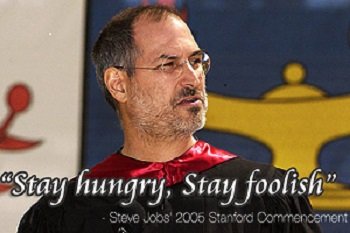Graduation season is upon us and, all across the country future leaders are donning a cap and gown for that much-anticipated walk. They will take the first steps of a journey into new beginnings. And after all the pomp and circumstance, in the not-so-distant future, these young men and women will begin to ascend the steps to leadership of their companies, government, or other institutions.
Of course, there will be speeches. Some graduation speeches are little more than a collection of platitudes.
Other commencement addresses, however, provide memorable leadership advice that will stand these new graduates in good stead, no matter where they wind up in business, or in life.
Leadership requires courage to follow your heart and intuition.
The late Steve Jobs didn’t mince words when he spoke at Stanford University in 2005. Jobs spoke openly about death and mortality, urging graduates to live with courage: “Your time is limited, so don’t waste it living someone else’s life. Don’t be trapped by dogma — which is living with the results of other people’s thinking. Don’t let the noise of others’ opinions drown out your own inner voice. And most important, have the courage to follow your heart and intuition.” Employee relocation may seem like a field where not much leading takes place. But all business, at its heart, is about dreams and goals. And corporate relocation is no different. Inspired leaders follow their dreams and goals, not the whim of every trend or opinion. Be focused; be inspired.
Leadership means keeping your integrity.
The tone of a company begins from the top. Leaders who project a message of integrity and trust create an environment in which such values can flourish. Making a quick profit is never worth it, if your company must leave its integrity behind to do so. Robert S. Mueller, FBI Director, speaking at the College of William and Mary, expressed this well when he said: “Regardless of your chosen career, you are only as good as your word. You can be smart, aggressive, articulate, and indeed persuasive. But if you are not honest, your reputation will suffer. And once lost, a good reputation can never, ever be regained. As the saying goes: If you have integrity, nothing else matters. And if you don’t have integrity, nothing else matters.” Leaders use failure to look for new opportunities. No one likes to fail. But not getting what you want teaches resilience and creativity – if you choose to learn from failure. When things don’t work out the way you planned, tell yourself the truth, own up to your part, and look for the opportunity within every disappointment. Conan O’Brien, speaking at Dartmouth College in 2011, recounted one of his greatest disappointments and a time when he felt he had failed. O’Brien summarized the leadership lessons he learned from his experience, saying, “It’s not easy, but if you accept your misfortune and handle it right, your perceived failure can be a profound catalyst for reinvention.”
Leaders learn how to seek, and use, feedback.
It’s tempting (and human nature) to seek approval for an idea or plan that you are already emotionally invested in. This tendency is all the more reason why leaders need to seek out feedback from trusted sources. Ideally, these opinions will come from sources which have no stake in your company. Be passionate about your ideas and convictions, but look beyond the echo chamber. Former Secretary of State, Condoleeza Rice, said it perfectly when she advised the 2012 graduating class at Southern Methodist University, “When you’re absolutely sure that you’re right, talk with someone who disagrees.”
Be. And be memorable.
Commencement speeches are usually remembered for who gave them, more than for what was said. But, as graduates soon discover, once you’re in the trenches of day-to-day life, even the most banal platitudes take on fresh meaning. At some point, the seductiveness of mediocrity beckons. This is where the rubber hits the road for leaders. It’s tempting to kick back, avoid challenges, and just get by. But true conviction requires that we do more than just exist. We must learn to rise above mere existence, and learn how to be fully present, fully passionate, and fully committed to excellence. Leaders must aspire to do more than just “be”. We must aspire to be memorable. Live every day as though you were living a memorable commencement address. Because leadership is about more than finding inspiring words to say in a public moment. While being a pithy public speaker is an asset, leaders become memorable less for what they say and more because their actions, life choices, and career choices engage and inspire others. Who are some leaders who have inspired or informed your leadership choices? Why? Please share your stories in the comments!


